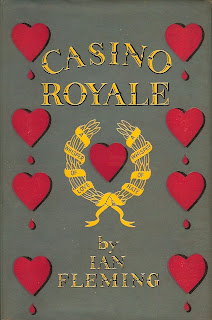 |
| First Edition, 1953 |
Although I'd seen and enjoyed the 2006 movie before starting the book, I wasn't sure what to expect. My understanding had been that while the basics of the main characters and premise had been set with Fleming's books, the films generally just took a name from a Bond novel, or at times even a line from a book, and then Hollywood threw on its own story. I was surprised to find that this book and movie, although created over 40 years apart, were right in line with each other, in everything from the characters and the plot to the tone and atmosphere. Each supporting character fills their role pleasingly: Vesper Lynd, Felix Leiter, Mathis, and Le Chiffre. Only M has a smaller role, Fleming not yet revealing that character's namesake and autobiographical relationship to Bond (mummy dearest). A part of this may be me putting my own expectations from on the film in the book, but I was not really expecting it to be so well written.
But it was. Fleming has a great command of language that, although not as subtle and transcendant as someone like Hemingway, mirrors that great writer in how he interprets and portrays a strong willed, passionate man with a quiet heart and a dry sense of humor. Don't get me wrong - Fleming is not making any really serious statements on the poignancy of the transient nature of life. He does show parallels between gambling, love, and espionage that teach James a lesson or two. But it's a thriller through and through. It's fundamental, it's elegant, and it drives you along by its style, not over-the-top melodrama.
Having at some point seen all the films, including the newest iteration Skyfall, I am well aware of what is expected from James Bond. The early chapters in the book quickly establish these symbols including the simple handgun, the vices, and the car - a Bentley. One of the greatest revelations of these comes when we learn that the famous drink is actually named for the first ever Bond girl. Over the years these things grew far beyond what they are in this book. And while all that can be fun, this novel and its corresponding film remind me how better it is when you strip it down to the characters and the story. No metal teeth. No remote control Aston Martin, and no spaceships.
Here are the things I like about both the book and the movie that, for me, make it the best of Bond:
Serious story and character
Low-tech
Juxtaposition of intuitive luck and careful calculation
Gritty & strong
Love is a dangerous risk
I really love that the two are so similar. Although the movie does improve on some things, the book establishes a Bond that is less focused on one-liners and conquests than he is on getting the job done. In fact, part of the charm of this Bond is learning that behind the sure-footed, arrogant front, he is able to question his entire lifestyle and contemplate giving it all up. But we know he can't and he knows it too. Despite the mistakes he makes along the way, by the end of the book he's learned why he's there and it is clear he has more to do. And if you're going to keep spying, you might as well keep the Bentley too.

No comments:
Post a Comment